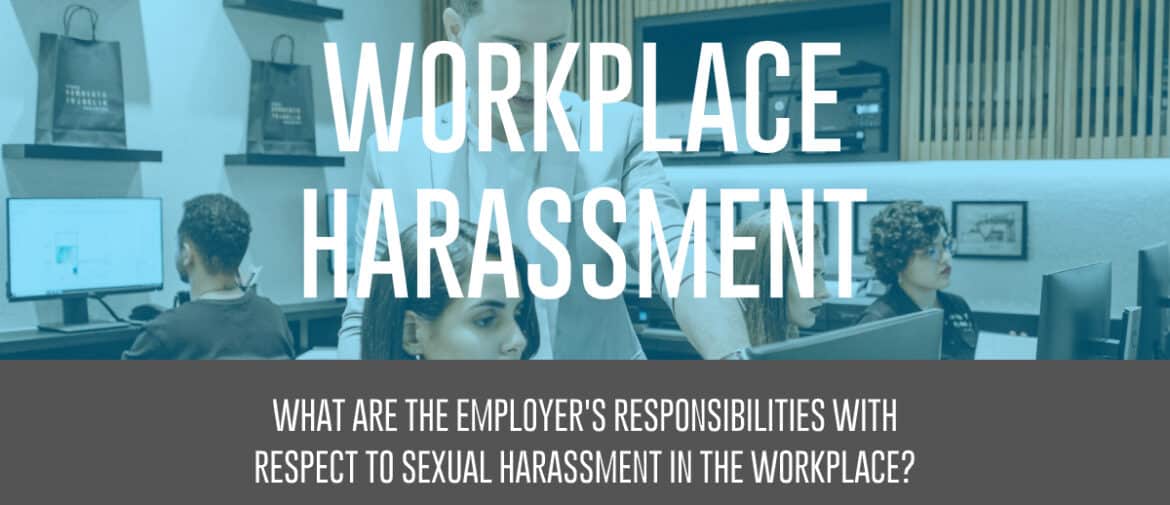Scenario: I am an employer, and ever since the "#MeToo movement" there have been a lot of complaints from my staff on sexual harassment.
I'm worried about my potential liability as an employer.
Does the employer always have responsibilities with respect to complaints relating to sexual harassment? Why?
One of the most foundational terms of employment is that a safe workplace will be provided.
It is an implicit term of contract, meaning that it is enforceable even if you do not specify it in a written contract.
Safety in the workplace is not limited to just safety in the physical sense; it also includes safety from any form of sexual harassment (or indeed any kind of harassment).
Therefore, an employer has a duty to supervise and actively deal with any issues of sexual harassment at the workplace; if you fail to take the necessary steps in a timely manner, you will have breached the implied term and may be found liable, not for causing the act but for allowing it to occur (without consequence or proper response).
Who Should Be Investigated?
The simple answer is that all relevant parties should be investigated. That would include the alleged victim, the alleged transgressor, as well as any witness who may shed light on the veracity of what happened.
It is important not to just listen to one side (e.g. the alleged victim) in forming a conclusion; for one, the alleged transgressor may have useful information, and turn out not to be the transgressor at all.
Moreover, it is crucial for the employer not to favour or be biased towards one party at the expense of the other; both sides need to be given a fair chance to present their views and evidence; an unfair, biased or otherwise incomplete investigation may lead to reputational losses of the alleged transgressor, for which you may be liable.
To be clear, it is not an obligation of the employer to come to a factually accurate conclusion on what happened, and who is at fault. However, it is incumbent on the employer to take all reasonable steps to find out the truth before concluding someone is at fault (or not at fault).
Who Should Conduct the Investigation?
To enhance impartiality, the investigator should be a neutral party.
For bigger companies, this could mean an outside investigator; for smaller companies, cost would obviously be an issue, and an employee who can neutrally come to a determination should be tasked with the investigation.
Furthermore, to the extent possible, the investigator should not be a first-timer simply going through the steps in a manual, but one who is experienced enough to conduct the process seriously and effectively.
Both the complainant and the alleged transgressor are entitled to proper investigation, not just an appearance of one. Taking this lightly could lead you to be liable to both employees, by way of constructive dismissal due to defamation, or unsafe workplace (as the case may be).
How Should the Investigation Be Conducted?
Given the sensitive nature of sexual harassment complaints, and in consideration of any request by the complainant, an employer would be wise to keep personal details confidential; however, enough details must be provided to the alleged transgressor so that he/she has a fair opportunity to respond to the allegations.
As you can see, this can be a very fine distinction, and you are advised to speak to an employment lawyer to ensure you are conducting such investigations sensitively but effectively.
If you have questions regarding sexual harassment in the workplace, please call us directly at (778) 565-4700 to schedule a confidential consultation.
The preceding content is for informational purposes only and does not constitute legal or professional advice. To obtain such advice, please contact our offices directly.
About the author
Simon practices in the areas of employment law and litigation, including small claims litigation. He has represented clients in commercial litigation matters such as commercial lease disputes, and breach of contract cases. In addition to court proceedings, Simon has experience assisting clients in arbitration proceedings and negotiating settlement agreements. Learn more about Simon.
Last updated on June 29th, 2022 at 12:42 pm

